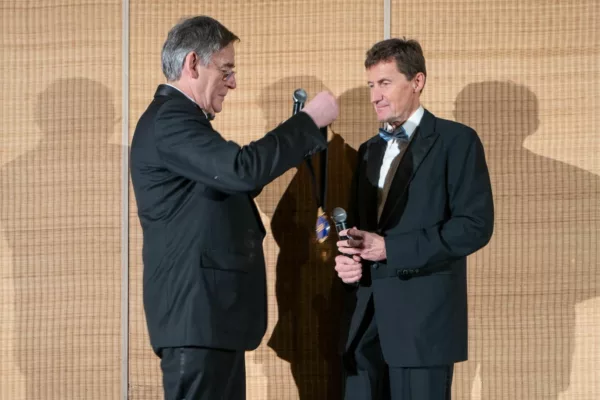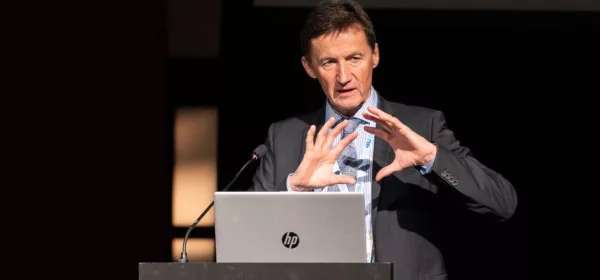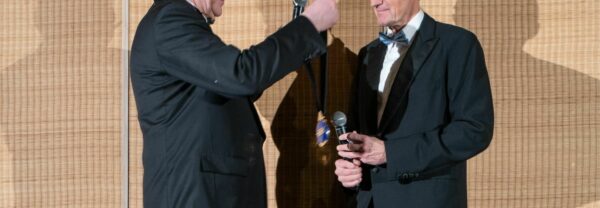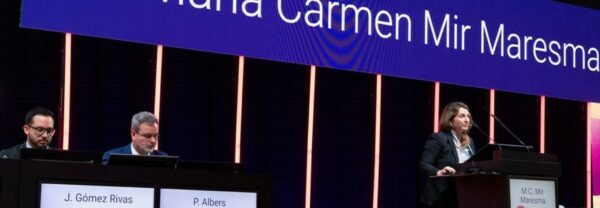The EAU has a new Secretary General
The end of the 38th Annual EAU Congress in Milan (EAU23) also marked the end of Prof. Chris Chapple’s (GB) eight-year period of leadership of the EAU. Prof. Chapple’s first term started in 2015 at the Madrid congress, when he succeeded Prof. Per-Anders Abrahamsson (SE). Prof. Chapple was succeeded by Prof. Arnulf Stenzl (DE) when his appointment was approved during the EAU23 General Assembly on Saturday, March 11.

Prof. Stenzl had been Secretary General-Elect since EAU22 in Amsterdam, creating an eight-month period of transition between the two congresses. The ceremonial handing over of the Secretary General’s medal took place on the Sunday night International Friendship Dinner, clearly an emotional moment for Prof. Chapple after a particularly turbulent second term for Prof. Chapple.
Prof. Chapple has every confidence in Prof. Stenzl to lead the EAU into the coming decade:
“Arnulf is a superb clinician, a scientist and a surgeon. He has the expertise, experience, and knowledge, having previously run our Scientific Congress Office (SCO), to be an excellent person to lead this organization into its next decade. I certainly know he will do this extremely successfully.”
“His background with the SCO brings in a scientific component to the EAU’s leadership, but again, in the Executive, we’ve worked closely together in these areas. As academic clinical surgeons, we’re involved in all of these activities. That’s a strength of the EAU as we move forward. Arnulf is just a great colleague with a well-deserved international reputation.”
Prof. Stenzl will be leading a smaller Executive than the EAU had in recent years, consisting of himself and Profs. James N’Dow (GB) and Jens Sønksen (DK) as Adjunct Secretary Generals.
The following reflections from Prof. Stenzl upon his appointment are from a longer interview featured in EAU:50 – The European Association of Urology celebrates its half-century, a book that commemorates the EAU’s golden jubilee.
On his predecessors:
“It’s important to note that these names resonate not because they were great leaders or managers, but because they have all really contributed to urology as a field, both in research and education. If you’re a great speaker or teacher, you can motivate the next generation of colleagues, but research and scientific innovation is different. Techniques and discoveries improve treatment of patients and are still useful decades later. It’s our responsibility to stimulate this kind of scientific innovation.”
Secretary Generals of the EAU
1974 - 1984 |
Prof. Willy Gregoir, Brussels (BE) |
1984 - 1992 |
Prof. Adolphe Steg, Paris (FR) |
1992 - 2004 |
Prof. Frans Debruyne, Nijmegen (NL) |
2004 - 2007 |
Prof. Pierre Teillac, Paris (FR) |
2007 - 2015 |
Prof. Per-Anders Abrahamsson, Malmö (SE) |
2015 - 2023 |
Prof. Chris Chapple, Sheffield (GB) |
2023 - |
Prof. Arnulf Stenzl, Tübingen (DE) |
On the smaller Executive:
“I think there will be a rebalancing in the EAU’s leadership. We will be including the Board members more in decision-making and strategic questions. If the Executive is too big, it’s not as connected to the board. We’re a big association with a large board and everyone has expertise to bring to the table.”
Challenges ahead:
“The image of urology as a profession, is changing and will change further, especially in some countries. Research may start to play a lesser role for residents and clinically working urologists.”
“Hospitals are asking for more clinical work because of the Working Time Directives. These come from the EU but individual countries can decide to adhere or opt-out. Not every country enforces these rules in the same way, but in some of the bigger European countries it’s more or less enforced.”
“This reduces doctors’ hours to 48 hours per week, with night shifts and so on. Their work could become completely clinical, with no time for research unless it’s (partly) financed by a research protocol. Being forced to work in day and night shifts, some residents will not have sufficient exposure to surgery.
Goals:
“Certain European countries are underrepresented in our Association. Some national societies see the EAU just as a competitor, not as a platform where they can meet. Some surprising statistics sometimes show up, where one country has more EAU members than another which has eight times the population. What are we doing wrong in that bigger country? The amount of urologists per capita differs of course, and the character of urology differs per country.”
“Looking at attendance figures, we can say that there’s both a large part of the membership that’s not interested in attending, and also a large pool of potential members coming to our meetings. We can work on appealing to both groups. A good communication strategy is very important in this regard.”
The EAU’s figurehead:
“I cannot do it as one person alone, we have to do it as a team. There is a great composition in the Executive and a good Board. The Board needs to be more involved in this work, with less emphasis on the Executive to do all the international outreach. The time is over for a single figurehead running around!”



